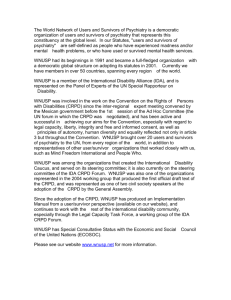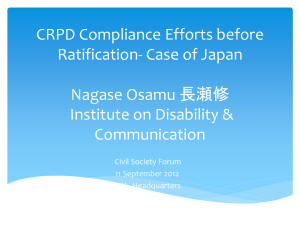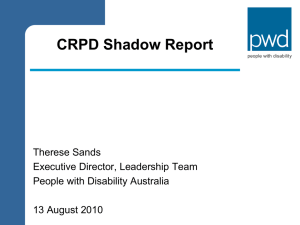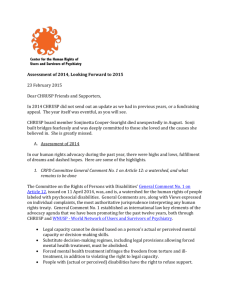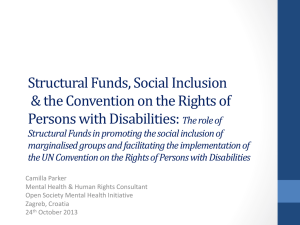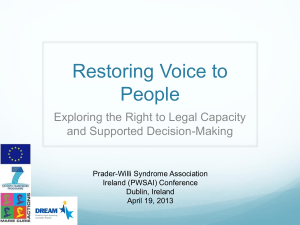IDA Factsheet on the Optional Protocol to the CRPD
advertisement
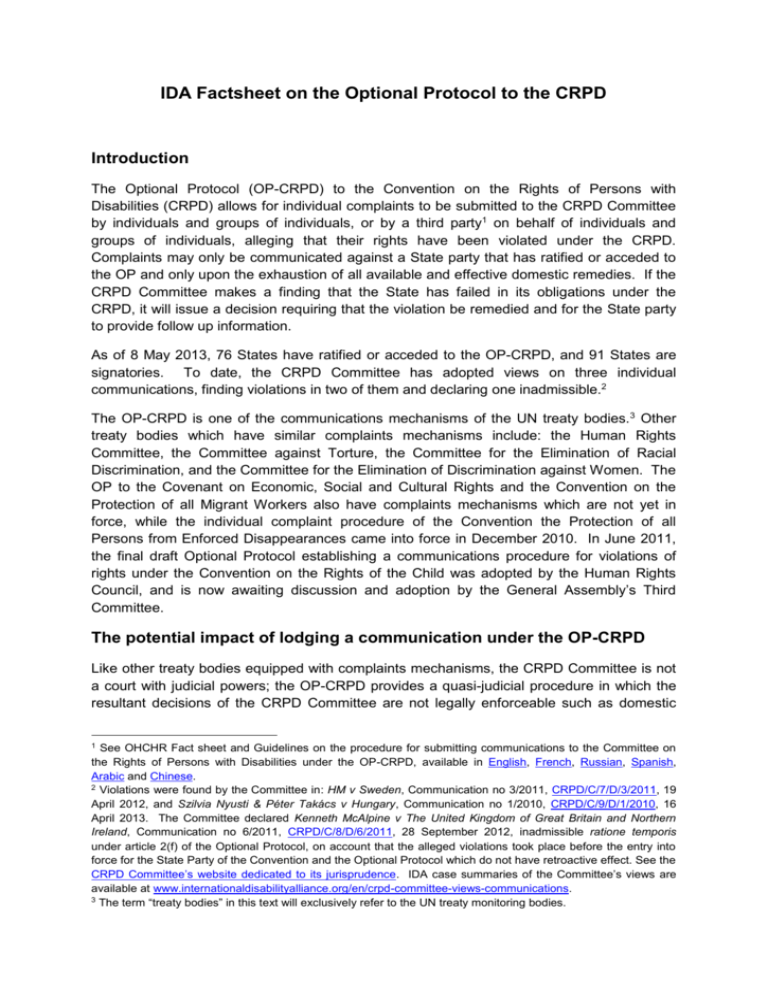
IDA Factsheet on the Optional Protocol to the CRPD Introduction The Optional Protocol (OP-CRPD) to the Convention on the Rights of Persons with Disabilities (CRPD) allows for individual complaints to be submitted to the CRPD Committee by individuals and groups of individuals, or by a third party1 on behalf of individuals and groups of individuals, alleging that their rights have been violated under the CRPD. Complaints may only be communicated against a State party that has ratified or acceded to the OP and only upon the exhaustion of all available and effective domestic remedies. If the CRPD Committee makes a finding that the State has failed in its obligations under the CRPD, it will issue a decision requiring that the violation be remedied and for the State party to provide follow up information. As of 8 May 2013, 76 States have ratified or acceded to the OP-CRPD, and 91 States are signatories. To date, the CRPD Committee has adopted views on three individual communications, finding violations in two of them and declaring one inadmissible.2 The OP-CRPD is one of the communications mechanisms of the UN treaty bodies.3 Other treaty bodies which have similar complaints mechanisms include: the Human Rights Committee, the Committee against Torture, the Committee for the Elimination of Racial Discrimination, and the Committee for the Elimination of Discrimination against Women. The OP to the Covenant on Economic, Social and Cultural Rights and the Convention on the Protection of all Migrant Workers also have complaints mechanisms which are not yet in force, while the individual complaint procedure of the Convention the Protection of all Persons from Enforced Disappearances came into force in December 2010. In June 2011, the final draft Optional Protocol establishing a communications procedure for violations of rights under the Convention on the Rights of the Child was adopted by the Human Rights Council, and is now awaiting discussion and adoption by the General Assembly’s Third Committee. The potential impact of lodging a communication under the OP-CRPD Like other treaty bodies equipped with complaints mechanisms, the CRPD Committee is not a court with judicial powers; the OP-CRPD provides a quasi-judicial procedure in which the resultant decisions of the CRPD Committee are not legally enforceable such as domestic 1 See OHCHR Fact sheet and Guidelines on the procedure for submitting communications to the Committee on the Rights of Persons with Disabilities under the OP-CRPD, available in English, French, Russian, Spanish, Arabic and Chinese. 2 Violations were found by the Committee in: HM v Sweden, Communication no 3/2011, CRPD/C/7/D/3/2011, 19 April 2012, and Szilvia Nyusti & Péter Takács v Hungary, Communication no 1/2010, CRPD/C/9/D/1/2010, 16 April 2013. The Committee declared Kenneth McAlpine v The United Kingdom of Great Britain and Northern Ireland, Communication no 6/2011, CRPD/C/8/D/6/2011, 28 September 2012, inadmissible ratione temporis under article 2(f) of the Optional Protocol, on account that the alleged violations took place before the entry into force for the State Party of the Convention and the Optional Protocol which do not have retroactive effect. See the CRPD Committee’s website dedicated to its jurisprudence. IDA case summaries of the Committee’s views are available at www.internationaldisabilityalliance.org/en/crpd-committee-views-communications. 3 The term “treaty bodies” in this text will exclusively refer to the UN treaty monitoring bodies. IDA factsheet on the Optional Protocol to the CRPD court judgments, or some other regional judicial mechanisms (e.g. European Court of Human Rights). If a violation is found, the views of the Committee are transmitted to the State party and constitute recommendations that need to be implemented by the State party and reported on back to the Committee within six months. While technically they may not be legally binding, the decisions of the CRPD Committee will be authoritative interpretations of the CRPD, and beyond the realm of application within the State party involved in a complaint, decisions will be of great value in the exercise of implementing provisions on the ground in all States parties to the CRPD. Ultimately, the effectiveness of the communications mechanism depends on the political will of the State party to recognise the competence of the Committee and to abide by their decisions. Yet initially, the use of communications procedure will depend on sufficient awareness of the instrument and the capacity of individuals, organisations of persons with disabilities (DPOs) and NGOs to identify victims, recognise violations and to lodge complaints to the CRPD Committee in accordance with the provisions of the OP-CRPD. It is well known that most treaty body communications are not registered or are declared inadmissible due to a failure to fulfil conditions for lodging a complaint.4 For example, many of the first complaints lodged to the CRPD Committee were presented against the United States and could not proceed to registration given the fact that the US has ratified neither the CRPD nor its Optional Protocol. Considering that treaty bodies with communications mechanisms are quick to develop a backlog of cases, and that many important resources and much time are consumed simply discarding complaints which do not fulfil the basic requirements to be reviewed by the treaty body, it is essential to widely disseminate information about the OP-CRPD within disability sectors and beyond to prevent or minimise this occurrence before the CRPD Committee and to maximise the efficient resolution of complaints. Moreover, the CRPD Committee is already facing great constraints due to the fact that few resources and very limited meeting time have thus far been allocated to them. One way in which awareness of the OP-CRPD and its use can be achieved is through the publication of communications lodged to the CRPD Committee. While the CRPD Committee treats all communications confidentially, it is up to the individual or group of persons, victims of violations, to decide for themselves whether they would like to make their case public. It may be the case that their complaint has already been made public within their country as a result of the domestic court proceedings. A simple press release upon lodging the complaint can help to raise awareness of this mechanism and lead others to its utilisation. If this information is being disseminated by a DPO or NGO, or an author of the communication on behalf of the individual or group, it is imperative to obtain their express consent to publicise the case. Additionally, it is possible for the victim(s) to guard their anonymity when making their communication public by the use of initials or letters, which do not reveal their identity, in the place of their name. 4 For example, out of the individual communications decided by UN treaty bodies in the first half of 2010, there was a 34 percent inadmissibility rate. See Kjærum, A. (2010) The Treaty Body Complaint System, 3 ISHR Human Rights Quarterly 27; concerning the Human Rights Committee alone, it is estimated that more than half of the cases registered are declared inadmissible; as of April 2010, the Petitions Unit had recorded 551 cases that had been dismissed by the Committee on admissibility grounds, see Open Society Justice Initiative, From Judgment to Justice, 22 November 2010, p. 121, fn 468. 2 IDA factsheet on the Optional Protocol to the CRPD IDA’s mission is to promote implementation of the CRPD and this extends to the promotion of the OP-CRPD. IDA seeks to raise awareness of the OP-CRPD and would request those who have lodged complaints and who consent to their case being made public, to share the complaint with IDA. Petitions, or parts thereof, or simply the subject matter raised and provisions invoked can be posted on IDA’s website with the express permission of the individual(s) involved. Such a compilation can assist future complainants in both the substantive and procedural aspects of bringing a complaint under the OP-CRPD. IDA can also offer expert advice to potential complainants in drafting their complaint in accordance with the requirements of the OP-CRPD, and provide assistance throughout the communications procedure. See below for the contact information of the IDA Secretariat. What to consider before bringing a complaint to the CRPD Committee: There are several factors to take into account before deciding to lodge a complaint to the CRPD Committee such as whether the complaint will be registered (in compliance with the preliminary criteria for a prima facie case) and deemed formally admissible by the Committee, the duration of the procedure, the result of the procedure, whether the complaint can be made to another adjudicatory mechanism, etc. Admissibility There are strict requirements to be fulfilled before a complaint will be accepted to be registered and deemed admissible by the CRPD Committee. Examination of the subject matter of the complaint will only proceed once it is established that the admissibility criteria are fulfilled. The following questions should be considered before drafting and sending in a complaint. Has the State party ratified the OP-CRPD? (Article 1(1), (2), OP-CRPD) Complaints can only be brought against a State party which has ratified the OP-CRPD. The UN Treaty Collection Database maintained by the Office of Legal Affairs (treaty depository) can be consulted for information on the latest status of State parties to the UN international treaties, and in particular the CRPD and the OP-CRPD.5 Does the subject matter of the complaint fall within the scope of application of the CRPD? Has the State party made any reservations or declarations concerning the subject matter of the complaint under the CRPD? (Article 14(1), OP-CRPD) The CRPD Committee is only mandated to examine complaints which allege a violation of one or more of the CRPD’s substantive rights. It should be kept in mind that a number of States parties have entered substantive reservations or declarations that may restrict the scope of their human rights obligations assumed under the CRPD. These should be reviewed when determining whether or not a complaint can be made under a certain 5For the UN Treaty Collection Database, see http://treaties.un.org/Pages/Treaties.aspx?id=4&subid=A&lang=en ; To view the States Parties to the CRPD, see http://treaties.un.org/Pages/ViewDetails.aspx?src=TREATY&mtdsg_no=IV-15&chapter=4&lang=en ; To view the States Parties to the OP-CRPD, see http://treaties.un.org/Pages/ViewDetails.aspx?src=TREATY&mtdsg_no=IV15-a&chapter=4&lang=en 3 IDA factsheet on the Optional Protocol to the CRPD provision of the CRPD. This information is available in the UN Treaty Collection Database by clicking on the CRPD.6 Did the alleged violation by the State party occur after the OP-CRPD entered into force for the State party? (Article 2(f), OP-CRPD) The violation complained of must relate to an incident which took place after the CRPD and the OP-CRPD entered into force in that country. There is an exception to this relating to continuing violation of rights. In cases in which the facts leading to the violation of rights of an individual or group of individuals took place before the entry into force of the CRPD and the OP-CRPD, but which continue upon their entry into force, a complaint can be made.7 For example, a complaint can be made to the CRPD Committee where an individual was arbitrarily detained in a psychiatric or social care institution before the CRPD and the OPCRPD’s entry into force in that country, and who continues to be arbitrarily deprived of their liberty following entry into force of those instruments. In the CPRD Committee case, Szilvia Nyusti & Péter Takács v Hungary, Communication no 1/2010 of 16 April 2013, while the origin of facts and domestic proceedings took place before the entry into force of the CRPD and Optional Protocol in Hungary, the relevant facts of the communication, which concerned the inaccessibility of ATMs to the authors, continued following the date of the entry into force of the Optional Protocol in Hungary, and thus fulfilled the admissibility conditions ratione temporis set out in Article 2(f) of the Optional Protocol.8 On the contrary, the Committee declared Kenneth McAlpine v The United Kingdom of Great Britain and Northern Ireland, Communication no 6/2011 of 28 September 2012 inadmissible ratione temporis under Article 2(f) of the Optional Protocol, given that the relevant factsconcerning the alleged unfair redundancy from employment and disability based discrimination - and related judicial proceedings had occurred before the entry into force for the State Party of the Convention and the Optional Protocol which do not have retroactive effect.9 In this case, following the conclusion of domestic proceedings by a decision of the Employment Appeals Tribunal in December 2007, the author made an application for leave to lodge a new appeal to the Court of Session in February 2010, i.e. after the entry into force of both instruments in the UK. This was rejected on the basis that the assessment of evidence had been a matter for the Employment Tribunal which had already examined his case, and the Court of Session found that no error in law had been identified. The Committee assessed that this judgment could not qualify as a reiteration of the previous rulings of the lower courts on the question of discrimination raised by the author, and that the decision did not violate the author’s rights under the Convention. 6 See http://treaties.un.org/Pages/ViewDetails.aspx?src=TREATY&mtdsg_no=IV-15&chapter=4&lang=en See Sankara et al v Burkina Faso (1159/03) –the Optional Protocol to the ICCPR entered into force 12 years after violation giving rise to the case. 8 CRPD Committee, Szilvia Nyusti & Péter Takács v Hungary, Communication no 1/2010, CRPD/C/9/D/1/2010, 16 April 2013. See IDA case summaries of the Committee’s views are available at www.internationaldisabilityalliance.org/en/crpd-committee-views-communications. 9 CRPD Committee, Kenneth McAlpine v The United Kingdom of Great Britain and Northern Ireland, Communication no 6/2011, CRPD/C/8/D/6/2011, 28 September 2012. See IDA case summaries of the Committee’s views are available at www.internationaldisabilityalliance.org/en/crpd-committee-viewscommunications. 7 4 IDA factsheet on the Optional Protocol to the CRPD Did the alleged violation take place within the jurisdiction of the State party? (Article 1, OP-CRPD) The violation must have taken place within the jurisdiction of the State party. This normally means on its territory, but may include any region or area in which the State party exercises effective control of the territory. For example, colonies or occupation where the State party’s armed forces exercise effective control of a territory abroad. In addition, States parties’ obligations extend to the conduct of its agents regardless of where those agents are located.10 Has the consent or authorisation of the individual or group of individuals concerned been obtained to lodge a complaint on their behalf?11 Complaints may be lodged by the victim him/herself, or the group of victims themselves. Complaints may also be lodged by third parties such as lawyers, NGOs including DPOs, on behalf of individuals or a group of individuals claiming to be victims of human rights violations under the CRPD. In such cases consent from the individual (or from each individual belonging to a group) must be obtained to authorise representation in the written form of a power of attorney or an authority to act. Where it is rendered impossible to obtain the consent of an individual under the circumstances (e.g. access to the alleged victim(s) is obstructed), the requirement of written consent is not compulsory. It will be necessary to set out the concrete circumstances which prevent the author from obtaining consent and it will be up to the Committee to accept or not the complaint. In cases where the individual or group of individuals may be considered to lack legal standing in the domestic jurisdiction (e.g. they have been deprived or restricted of their legal capacity), the CRPD Committee has made it clear that it will apply Article 12 of the CRPD to recognise the legal capacity of the author or victim regardless of whether this capacity is recognized in the State party concerned.12 Complaints cannot be lodged anonymously.13 If there is a wish to maintain one’s anonymity before the public, then a request can be made to the CRPD Committee not to reveal the identity or identities of the individual(s) concerned in the final decision. The CRPD Committee may also decide to guard anonymity before the public by its own initiative. The identity of the author(s) of the complaint will therefore be represented by initials or a letter. While one’s identity will not be revealed to the public upon request, the identity of the author will always be shared with the State party concerned. Does the communication constitute an abuse of the right of submission? (Article 2(b), OP-CRPD) 10See cases of the Human Rights Committee: Montero v Uruguay (106/81), Lichtensztejn v Uruguay (77/1980). See, p 156, Working with the United Nations Human Rights Programme: A Handbook for Civil Society, Chapter VIII http://www.ohchr.org/Documents/Publications/NgoHandbook/ngohandbook8.pdf 12 See Rule 68(2) of the Rules of Procedure of the CRPD, CRPD/C/4/2,13 August 2010 13 Article 2(a), OP-CRPD 11 5 IDA factsheet on the Optional Protocol to the CRPD A complaint will be considered inadmissible as constituting an abuse of the right of submission when: o Submitting a complaint incompatible with the provisions of the CRPD ; o Submitting false or misleading information; or o Submitting a case a very long period of time after the violation was committed with no convincing reason for the delay. Has the subject of the complaint been submitted for examination by another international or regional complaints mechanism? (Article2(c), OP-CRPD) Complaints will not be considered by the CRPD Committee if the same matter has already been examined by the Committee or has been or is being examined under another procedure of international investigation or settlement. Jurisprudence from other treaty bodies has construed this to mean: o The “same claim concerning the same individual.”14 o Another procedure of international investigation or settlement includes other UN treaty bodies, the European Court of Human Rights, the African Commission of Human and People’s Rights, and the Inter-American Court of Human Rights but does not include complaints submitted to the special procedures of the Human Rights Council such as to the Special Rapporteurs. If cases have been rejected by the European Court and Inter-American Court on purely procedural grounds (non-exhaustion of domestic remedies, non-respect for six month rule) then it is not considered to have been “examined” and may be subsequently submitted to the CRPD Committee. Have all effective domestic remedies been exhausted? (Article 2(d), OPCRPD) In order for a complaint to be deemed admissible, all domestic remedies must have been exhausted in the State concerned before bringing the claim to the Committee. This is the principle of subsidiarity; national mechanisms must have the opportunity to examine allegations of violations and to provide a remedy if violations are found before the complaint is taken to the international level. Individuals or a group of individuals therefore must exhaust all available and effective domestic remedies before addressing their complaint to the CRPD Committee. A remedy is considered effective if it offers the applicant a reasonable perspective of redress. Mere doubts about the effectiveness of a remedy do not dispense with this requirement. However, there are limited exceptions to the rule. The following kinds of remedies are exceptions to the admissibility requirement of exhaustion of domestic remedies: o Ineffective, inadequate, futile or dangerous remedies 14 See Fanali v. Italy (75/80). Elements to identical claims: 1) same individual, Leirvag and others v Norway 2) refer to the same facts and events and 3) raise « substantially the same issues » Glaziou v France (452/91) (Human Rights Committee) 6 IDA factsheet on the Optional Protocol to the CRPD o Exceptional remedies (including highly discretionary remedies) o Unduly prolonged remedies If a remedy was not pursued for one of these reasons, it is necessary to give detailed reasons in the original complaint of why the general rule for exhaustion of domestic remedies does not apply. It is equally necessary to give details of the efforts made to exhaust available and effective domestic remedies highlighting the arguments advanced before the national authorities and the dates and outcome of the proceedings. Copies of decisions of national courts or administrative bodies should be attached to the complaint to the CRPD Committee (and summary translations of those decisions into one of the Secretariat’s working languages15). Choice of forum The body of decisions of treaty bodies form a key part of the jurisprudence of international human rights law. Increasingly, domestic courts refer to treaty body jurisprudence, and similarly other regional adjudicatory mechanisms, such as the European Court of Human Rights and the Inter-American Court of Human Rights, invoke treaty body jurisprudence in an effort to uphold the coherence of international human rights standards. It must be reminded that the UN treaty bodies’ complaints mechanisms are quasi-judicial procedures, i.e. they are not courts per se and their decisions are not legally binding like domestic court decisions or judgments coming from the European Court of Human Rights, or other regional judicial mechanisms. Upon the finding of a violation or violations, the relevant treaty bodies can issue views or decisions at the conclusion of their examination of a complaint which constitute recommendations for the State party to take action to remedy the individual (or group) case. However, there is not yet any binding follow up mechanism to ensure that a remedy is delivered by the State party. Further, treaty bodies cannot award compensation to victims of violations. While several of them have made recommendations for the State party to provide pecuniary compensation, treaty bodies have never quantified the amount nor is there a mechanism to ensure that financial compensation is awarded. On the other hand, the judgments of other adjudicatory mechanisms such as the European Court of Human Rights or the Inter-American Court of Human Rights are legally binding and they can order an award of compensation to individual victims and oblige the State to enforce judgments. There are thus several factors which may determine the choice of the mechanism to which the complaint will be directed, these include requirements as to standing, the probable duration of the proceedings, the extent to which domestic remedies have been and need to be exhausted, the case strategy, the resources available and the substantive legal questions at issue. Depending on these considerations, it may be preferable for an individual or group of individuals to lodge their complaint to an international adjudicatory body other than the CRPD Committee. The table below presents some factors to take into account when making that decision. 15 English, Spanish, French, Russian, Arabic and Chinese, see Rule 26 of the Rules of Procedure of the CRPD, CRPD/C/4/2,13 August 2010 7 IDA factsheet on the Optional Protocol to the CRPD International Adjudicatory CRPD Committee Bodies Factors European Court of Human Rights Authors of Individuals or Individuals complaint group of - must be individuals represented - can be self- by a lawyer represented or represented by a third party (lawyer or NGO) Substantive rights Admissibility criteria InterAmerican Commission of Human Rights African Commission of Human and People’s Rights Other treaty bodies Individuals or individuals or Individuals group group CEDAW) (HRC, - can be self represented but highly recommended to have a lawyer of - can be self + groups represented (CERD) or represented by a third party (not necessarily a lawyer) CAT, individuals Covering both Civil and Civil and civil and political political rights, political rights rights only one and provision economic, related to social and economic, cultural rights social and cultural rights on progressive development Covering both civil and political rights and economic, social and cultural rights Civil and political (HRC & CAT) No time limit for lodging complaints once domestic remedies are exhausted Been shown to be more lenient than treaty bodies regarding exhaustion of domestic remedies No strict time limit for lodging complaints once domestic remedies are exhausted (CAT, CEDAW, HRC. For the HRC, a communication can be considered as an abuse of right to submission if it is lodged after 5 years from exhaustion of domestic remedies.16 ) Six months – can only lodge a complaint within six months of exhausting domestic remedies (CERD) Six month rule – can only lodge a complaint within six months of exhausting domestic remedies Six month rule – can only lodge a complaint within six months of exhausting domestic remedies Civil and political and economic, social and cultural (CEDAW & CERD) 16 Or, where applicable, after 3 years from the conclusion of another procedure of international investigation or settlement, unless there are reasons justifying the delay taking into account all the circumstances of the communication, see Rule 96(c) of Rules of Procedure of the Human Rights Committee. 8 IDA factsheet on the Optional Protocol to the CRPD Length time of 1.5 to 3 years 5-6 years 6 years 2.5-3.5 years 2-4 years Very few cases on disability rights; no specific focus on disability rights in instrument Very few cases on disability rights; no specific focus on disability rights in instrument Very few cases on disability rights; no specific focus on disability rights in instruments although ICCPR, CAT, CERD and CEDAW all have a mandate to protect persons with disabilities (based on the first three views adopted) Development Specific focus of on disability jurisprudence rights within CRPD Very few cases on disability rights; no specific focus on disability rights in instrument Complaints should include the following information:17 The following information must figure in complaints being submitted to any of the treaty bodies with a communications mechanism, including the CRPD Committee. o The victim’s/author’s identity (or identities if multiple victims), such as name, address, date of birth and occupation, nationality, or other forms of identifying details/data of the author(s)/victim(s); o In cases where there is a third party representing the victim(s), a power of attorney or form of authority which provides consent by the individual or group of individuals for the representative to act on their behalf. o The name of the State party against which the communication is directed; o The object of the communication; o Thorough and clear account of the facts presented in chronological order; o Account of arguments as to why the facts in the case amount to a violation of the human rights contained in the treaty whose provisions are invoked, and identification of the relevant article(s) of the treaty alleged to have been violated; o Steps taken by the author and/or victim to exhaust all available judicial domestic remedies; as well as any effective administrative remedies which might be available in the State concerned; o Details of the extent to which, if at all, the same matter is being examined under another procedure of international investigation or settlement. 17 Please consult the Guidelines for submission of communications to the Committee on the Rights of Persons with Disabilities under the Optional Protocol to the Convention, 15 June 2011, http://www.ohchr.org/Documents/HRBodies/CRPD/CRPD-C-5-3_en.doc 9 IDA factsheet on the Optional Protocol to the CRPD o All documents relevant to the claims and arguments (court decisions, etc. + summaries in one of the Secretariat’s working languages18); o Copies of relevant national laws, where available. Authors of complaints are encouraged to consult the factsheet and guidelines on the submission of communications to the Committee on the Rights of Persons with Disabilities under the Optional Protocol to the Convention available from their website.19 Complaints are to be submitted in writing or in an alternative format that enables a legible copy of its content to be transmitted to the State party.20 4. Under rule 55, paragraph 3, read in conjunction with rule 24 of the Committee’s rules of procedure, communications are to be submitted in writing or in an alternative format that enables a legible copy of its content to be transmitted to the State party. Procedure after registration of the complaint (Articles 3, 5, OP-CRPD)21 Once a complaint has been registered, the case is transmitted to the State party concerned which is given an opportunity to provide its observations on the admissibility and merits of the communication. The State party is given a deadline of six months for its observations on admissibility and merits and two months for the observations on admissibility only. Once the State party submits its observations, they are transmitted to the author for comments. Upon receiving the author’s comments, the case is ready for consideration by the Committee. The whole procedure is carried out in writing and there are no oral hearings. In the course of examination of a communication, the Committee may obtain documentation from organisations within the UN system or other bodies that may be of assistance in the consideration of the communications, provided that the Committee shall afford each party an opportunity to comment on such documentation or information within fixed time limits.22 While determination of admissibility and a decision on the merits is usually considered simultaneously, they may be split at the request of the State party (when the State party contests admissibility within two months of being communicated the case by the Committee). Any decisions on admissibility and/or the merits are determined within the Committee by simple majority and are transmitted to the author of the complaint and the State party simultaneously. If the Committee finds that the State party failed in its obligations to the individual or group of individuals, it will set out recommendations to the State party to provide a remedy for the 18 English, Spanish, French, Russian, Arabic and Chinese, see Rule 26 of the Rules of Procedure of the CRPD, CRPD/C/4/2,13 August 2010 19 See OHCHR Fact sheet and Guidelines on the procedure for submitting communications to the Committee on the Rights of Persons with Disabilities under the OP-CRPD, available in English, French, Russian, Spanish, Arabic and Chinese. 20 See Fact sheet on the procedure for submitting communications to the Committee on the Rights of Persons with Disabilities under the Optional Protocol to the Convention, 15 June 2011, CRPD/C/5/2, para 4. See Rules 24 and 55(3) of the Rules of Procedure of the CRPD, CRPD/C/4/2,13 August 2010 21 See also Rule 70 of the Rules of Procedure of the CRPD, CRPD/C/4/2,13 August 2010 22 See Rule 73(2) of the Rules of Procedure of the CRPD, CRPD/C/4/2,13 August 2010 10 IDA factsheet on the Optional Protocol to the CRPD individual or group concerned and will request that the State provide follow up information within six months. The Committee’s final decision on the merits of a case or of a decision of inadmissibility is posted on the OHCHR website as part of the Committee’s jurisprudence. Interim measures (Article 4, OP-CRPD)23 At any time after the receipt of a communication and before a determination on the merits has been reached, the Committee may transmit to the State party concerned, for its urgent consideration, a request that it take interim measures to avoid irreparable damage to the victim or victims of the alleged violation.24 If the author of a complaint wishes to request the Committee to consider undertaking interim measures, this should be clearly stated in the original complaint, or if the need arises at a later period, the urgent request should be transmitted to the Committee (see contact details below). The risk of irreparable harm must be imminent, real and personal. For example, interim measures could be requested where a forced medical intervention, such as forced sterilisation or an involuntary medical experiment, will take place without the consent of the individual concerned. The State party may contest the continued application of interim measures, and on the basis of the State party’s explanation or submitted information, interim measures can be withdrawn by the Committee. Follow up to the Committee’s decision (Article 3, OP-CRPD)25 The State party is invited to provide information on the implementation of the Committee’s views within six months of the decision. The Committee shall designate for follow-up on views a Special Rapporteur or working group to ascertain the measures to be taken by States Parties to give effect to the Committee’s views. In the context of follow-up activities, the Special Rapporteur or working group may make such contacts and take such action as is appropriate to their mandate, for example with the approval of the Committee and the State party itself, they may make necessary visits to the State party. Follow up activities will be regularly reported to the Committee and to the General Assembly in the Committee’s biennial report. DPOs’ role vis-à-vis the communications procedure DPOs and other civil society actors have a key role to play in raising awareness of the OPCRPD and in assisting victims to lodge complaints, and supporting them throughout the communications procedure. There are also many advocacy opportunities which open up once a communication is concluded to ensure a remedy for the individual or group concerned, and for effective implementation of the CRPD Committee’s decision to ensure non-repetition of violations which may necessitate wider measures such as legal and policy 23 See also Rule 64 of the Rules of Procedure of the CRPD, CRPD/C/4/2,13 August 2010 It must be understood that the CRPD Committee cannot grant measures that are permanent rather than provisional (interim) in nature, as this would act to prejudge the outcome of the examination of the communication by the Committee. 25 See also Rule 75 of the Rules of Procedure of the CRPD, CRPD/C/4/2,13 August 2010 24 11 IDA factsheet on the Optional Protocol to the CRPD reform. In particular, during the 8th session of the CRPD Committee held in September 2012, the Committee took the decision to “accept the possibility for third party interventions to be submitted with respect to individual communications lodged under the Optional Protocol.” As a result, DPOs may decide to submit a third party intervention or amicus brief with respect to an individual communication pending consideration by the CRPD Committee. However, given that currently neither the CRPD Committee, nor the OHCHR Petitions Unit, disseminate information about individual communications due to the confidential nature of communications, the only possibility for DPOs to be privy to information about submitted individual communications is through the action of the author(s) to consent to sharing and disseminating information about their case. They may wish to do so guarding their anonymity. Before submitting a communication o Identifying gaps in law, policy and practice for potential CRPD litigation; o Identifying victims of violations; o Raising awareness of the OP-CRPD mechanism; o Training on using the OP-CRPD; o Providing information and advice on admissibility of complaints such as exhaustion of domestic remedies During the communications procedure o Providing assistance to complainants, including advice and information on the procedure itself, and moral and emotional support throughout the procedure; o Submitting third party interventions or amicus briefs with respect to individual communications lodged under the Optional Protocol, provided that the information of the case has been disseminated publicly upon the consent of the author(s). o With the permission of complainants, publicising the case before the public and the government Follow up activities To ensure that the jurisprudence of the Committee is widely disseminated amongst the State’s policymaking organs and other bodies and to the public at large, DPOs and other civil society actors may undertake actions such as: o Making translations of the decision available into the local languages of the State party concerned, and also making the decisions available in accessible formats and in local sign languages; o Holding a press conference on the Committee’s findings; o Holding a roundtable gathering key policymakers within government, DPOs and other stakeholders to discuss implementation of the Committee’s decision; 12 IDA factsheet on the Optional Protocol to the CRPD o Meeting with the relevant Ministries or state bodies responsible for implementing the decision in order to provide technical assistance and training in understanding the obligations which need to be undertaken and to offer cooperation in ensuring compliance with the Committee’s decision; o Undertaking research into steps needed to be taken to comply with the Committee’s decision, e.g. law reform, identification of training needs, etc; o Gathering good practice examples and model policies and laws from other countries which could assist in effecting change within the State party concerned. o Reporting to the Committee on monitoring implementation of the Committee’s decision by the State party. Complaints should be sent to: By post: By fax: By email: Petitions Team Office of the High Commissioner for Human rights United Nations Office at Geneva CH-1211 Geneva 10 +41 22 917 9022 (particularly for urgent matters such as interim measures) tb-petitions@ohchr.org If you have any questions or are seeking advice on lodging a complaint under the OP-CRPD or to any other treaty body, or wish to share information about individual communications including with a view to encouraging the lodging of third party interventions related to filed communications, please contact the IDA Secretariat: vlee@ida-secretariat.org We also welcome the sharing of complaints (with the permission of the individual complainant(s) concerned) and envisage to compile a collection of petitions for consultation on IDA’s website. Further resources CRPD Committee jurisprudence OHCHR Fact sheet and Guidelines on the procedure for submitting communications to the Committee on the Rights of Persons with Disabilities under the OP-CRPD, available in English, French, Russian, Spanish, Arabic and Chinese Working with the United Nations Human Rights Programme: A Handbook for Civil Society, Chapter VIII OHCHR Fact sheet no 7 on complaints procedures Caselaw database including jurisprudence http://sim.law.uu.nl/SIM/Dochome.nsf?Open from the UN treaty bodies: 13
